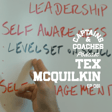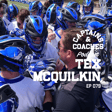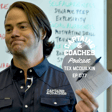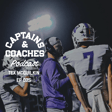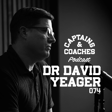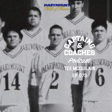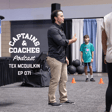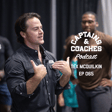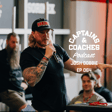Athlete Stories: Hero, Hardship, Highlight
00:00:00
Speaker
in the middle of the off-season workouts, we'll share what we call three H's. And we'll give every athlete the opportunity to stand up in front of the group and be able to talk about who their hero is in their life, to talk about a hardship that they've overcome, and we give them all the opportunity to talk about what a highlight is, what was one of their big highlights, and it's amazing what you learn about people. In the model behavior, we're gonna share first. And the thing I always tell the coaches is, I'm like, you better be real when you go up there.
00:00:29
Speaker
because they can see through it. yeah So don't don't go up there and give me something that I can read. Go in front of this team and give them something that youre the players are going to say, man, I didn't, I had no idea coach was struggling with that.
Leadership in the NIL Era
00:00:40
Speaker
Welcome to the captains and coaches podcast. We explore the art and science of leadership through the lens of athletics and beyond. I'm your host Texan Quilkin and today's conversation takes us to Terpsville as we visit the university of Maryland's beautiful football training facility.
00:00:55
Speaker
where director of football strength and conditioning coach Ryan Davis is redefining what it means to develop a competent and competent student athlete. He'll share how his three HS framework prepares athletes for life beyond sports and brings them together as a team and how he's adapting his leadership style in the NIL era.
00:01:14
Speaker
Get ready for an episode packed with practical wisdom on building trust, fostering accountability, and creating a culture where every athlete can thrive. With that, let's hand it off to Coach Ryan Davis. Ready, ready, and break.
Building Relationships with Athletes
00:01:31
Speaker
I am in College Park, Maryland, sitting down with Coach Ryan Davis. How you doing, man? Doing great. Welcome to Terpsville. I love it. This is my first time in the weight training facility, but I've attended many of football games, many of Maryland Duke basketball back in ACC days. I love that yeah have that. Yeah, my grandfather went here, so I have an affinity for the program. And yeah, this this place is immaculate.
00:01:54
Speaker
Yeah, we are we are extremely fortunate to be in the facility that we're in. And um if your grandfather went here, he was probably watching basketball games in what is now our indoor facility for football. Oh, wow. The old coal arena is actually our indoor facility now. So a lot of history in this place. Yeah. Yeah. I used to hear stories of the the bird stadium also was the lacrosse barn dorms.
00:02:20
Speaker
Absolutely. So yeah, we got to walk by that later. Love it. We're going to start with a little spelling bee. OK. How do you spell love? I was taught by by Pat Sullivan that that is spelled T-I-M-E when it comes to athletes.
00:02:36
Speaker
So walk us through that a little bit. You have a ah special thing going on. We've had some some conversations before this, man, and I appreciate your philosophy. But now let's start to lay it out for our audience here. My first head job, I worked at Sanford University down in Birmingham, alaba Alabama. And I worked for a guy by the name of Pat Sullivan, um literally one of the greatest human beings that I've ever been around, um taught me so much as ah as a coach, taught me so much as a person.
00:03:05
Speaker
um But he always said to me when I got that job, he said, if you number one, if you make every decision about your student athletes, if you make it about the athletes, you'll always kind of keep yourself out of it out of hot water. The second thing he said is if you invest the right amount of time and energy into them, and you have the right relationships with you, it's always going to help your career. And so Pat used to tell us that you know love can only be spelled with time.
00:03:32
Speaker
The only way that you can get there to develop the relationship with the athlete is to invest time in that athlete. And it's not just time in the weight room. It's not just time on the field. So um since then, i've I've tried to be very intentional with my staff. I've tried to be very intentional with our athletes about um not only the time that we're investing, but how we're investing that time.
00:03:54
Speaker
There's things that that I love to do. There are things that all these guys love to do. And when you've got a staff, you try to kind of meet in the middle somewhere and and figure out, you know, where can we go and kind of take the walls down, be a little bit vulnerable and be able to spend that time with each other. New coaches coming in. I imagine you have interns. How do you start to teach that? Because a new coach, they are obsessed with programming. They think it's all about what's on the the the paper, that the card that they're handing the athletes. So how do you introduce this value and connection in getting to know the kid? So one of the things that we'll do is we'll ask like an intern, for example, they always want to know about programming, like you said. And the question that I'll have for them is, how are you going to get the best player on our team to work the hardest?
Motivation Over Programming
00:04:38
Speaker
They can never answer it. No. Well, it's like, Coach, i you know,
00:04:43
Speaker
the The only way that you can get there is by learning about that player, spending time with the player, getting to the point where they're gonna tell you and you're gonna get to learn about them, but really you're gonna learn what makes them tick. You're gonna learn what the motivating factors are, what the inspiring factors are. You're gonna learn why they're doing it. You're gonna learn how they got here. You're gonna learn things about them where you know this is why they don't wanna let such and such down.
00:05:10
Speaker
And when you start to invest the time and you start to learn those things, you start to realize that the programming is very important. What you do from a program standpoint is extremely important, but it's not the most important thing when it comes to training these guys. Or we're really training anybody for that matter because they're not gonna work harder because of the letters behind your name. They're gonna work hard because they trust that you have their best interests in mind.
00:05:36
Speaker
And that's when the programming becomes particularly important. And so when we have new staff, when we have interns, whatever it is, we that we kind of walk them through that process. um And they really start to see it. they They start to live out that process when you get in the meat of the off season, you get in the meat of summer training, and they really start to understand the value of that process and what we're trying to get accomplished.
00:06:01
Speaker
who and ah I've heard you speak about the in-betweener and calling yourself an in-betweener. So speak to us about how what that means for an athlete, but the also the opportunity for a younger coach to step in and have impact. Maybe they're not writing the program. Yeah, so um there's ah there's a few ways that I've kind of described this. so um We are kind of the filter system as strength coaches between maybe the position coach, maybe the head coach, because we didn't we have no vested interest in who goes and plays on the field. So because of that, we don't control playing time. We want to be able to see everybody at their best, all right? um And the other part of that, there's there's two phases of this. The in between also is, from a philosophical standpoint,
00:06:52
Speaker
I would consider myself
The Role of Strength Coaches
00:06:54
Speaker
that because we lean on sports science, but we don't let sports science drive the program. so we We still have to look at what we're coaching. We still have to see what we're coaching. We still have to be able to develop relationships. and In that aspect, i'll I'll give you this. I had someone from Catapult say this to me. They said, coach if if the If the athlete puts a catapult unit on, and one of them goes over there and does 15 up downs, and the other one goes and runs a 110, the catapult's job is to measure mechanical stress. It's gonna log the work similarly. The eyes are what give it context.
00:07:33
Speaker
So you have to be able to see what the athlete is doing to give the data context. You got to know how you're going to practice. You got to know how you're preparing these guys. So from that sense, you know, when you look at those two things, um, I think those are part of what make the strength coach position so valuable nowadays because of those things. for the the athlete as an in-betweener, they may not feel, they're putting in the work, but they're not getting the playing time. That may be the only thing that they're cashing in on as as a reward. So how do you then encourage them to continue to put in the effort as an in-betweener? We want to coach, it's not just the physical aspect of that, but we want to coach the mental aspect too. What are the things that you can control? All right, playing time's really not one of them.
00:08:17
Speaker
So the things that you can control, you talk to the athlete and it's like, look, if we improve these things, so my attitude, my effort, my approach, my work ethic, if I can improve all these things, most of the time the athlete's gonna agree that it gives us a better version of them.
00:08:34
Speaker
Right? If we get a better version of you, we've got a better chance at increasing that playing time. And so we're not just trying to coach the athlete to be the best out on the field. We're really trying to coach them to be the best version of who they can be so that whatever it is they're doing, it gives them a better chance at success. I like that. So the playing time is is rewarding, but it's not the reward. Absolutely. Absolutely.
Influence in Leadership
00:08:59
Speaker
So Dan, speak to us also within the in-betweeners on opportunities for them to lead. So they may not have the C on their chest. They may not be breaking down the the huddles. So what are their opportunities for those individuals to lead?
00:09:11
Speaker
Well, also, this is another thing that I learned from Pat Sullivan. Leadership is influence, right? And we don't get to choose influence. So he would tell me all the time, he'd say, you know, as a head strength coach, you have a lot of people that watch you. You have a lot of people that put eyes on you. And it's not all the time that God gives us the ability to see the people that we're influencing, whether it be positive or whether it be negative.
00:09:32
Speaker
somebody's paying attention to you that you don't know. You may open doors for somebody that you don't know. and And the crazy thing is, at this point in my career, I've had people reach out to me that are like, man, I've been following you since whatever, and you don't even realize that I've tried to model my career after you. So when it comes to the athlete, we don't get to choose influence.
00:09:56
Speaker
Coach Locks did this drill a couple years ago. um We went into the meeting room and and we did this like Google survey. And what he said was one of the questions on the Google survey was, um who inspires you the most by the way they work? And the answer not only surprised us, but it surprised the athlete that the guys chose.
00:10:22
Speaker
And it was crazy how many people voted for this guy on our team because he shows up every day. He's the first one in the building. He goes up, he breaks down film, he goes out, works on the sled. He's doing all this before he ever comes in to train.
00:10:37
Speaker
Eating is like an event to him. So when he fuels his body, it's like we pick the guys kind of pick on him sometimes because they're like, man, this is a full on event when you get to go to the dining hall. But that's his attitude and mindset of how he approaches the way he fuels his body, the way he trains, the way he does the extra work. So I remember when we did that and he kind of he won that vote, he was so surprised because he looked at me and said, I didn't know anybody was paying attention.
00:11:08
Speaker
athletes pay attention to a lot. Yeah. they're They're very resilient and they pay attention to a lot. So when it comes to that whole leadership is influence, we don't get to choose our influence. So we're going to do the right thing because it's the right thing to do. All right. And and you never know who's watching you or who has eyes on you or how you're affecting that person's life.
00:11:29
Speaker
So that that was all public. Everybody got to see. Everybody got to see it. And I think back to what Coach Sullivan used to say. we We oftentimes God doesn't give us the ability to see who we're influencing. And I thought, how cool is it now that we did this activity and the way Coach Locke set this up, the athlete actually got to see that, man, I'm having ah a positive impact on a lot of people around me. Yeah. Now, i I feel that would encourage him to now be more of a vocal leader.
00:11:56
Speaker
because it reinforced the confidence of the actions that he was taking. Absolutely. 100%. Time out. What if I told you the path to transformation isn't about rigid schedules and crushing yourself daily in the gym. It's about moving with purpose and intention. At captains and coaches, we understand that true leadership starts with embodiment. When you look the part, you lead the part.
00:12:18
Speaker
but here's what makes our training programs different. The old bowl training program adapts to your life, not the other way around. Choose your own adventure, daily workouts less than 60 minutes a day with rep schemes that flex depending on your energy and feel.
00:12:32
Speaker
because we know sustainable growth happens when you become a self leader and stop missing workouts. This creates a powerful ripple effect to change how you move. You transform your mental, emotional state, transform your emotions and you elevate your decisions, better decisions. That's when your entire quality life shifts. Join the old bull movement. Let's build more than a stronger body. Let's create a purposeful, powerful life on your terms. Click the link in the show notes for a seven day free trial to old bull program.
00:13:02
Speaker
and get started today. And now, back to the show. Ready, ready, and ready. In your career, have you seen players step into that more vocal role? So they did everything right in their actions.
00:13:14
Speaker
but then where where have you stepped in as a mentor to help them find their voice and lead by by not only example, but now with their word? Yeah, so I think that first part you're talking about is is modeling behavior, right? lead That's what people call leading by example. um I think that's a big part of of being able to build that confidence to go out and then be a little bit more vocal when you're able to consistently model the right types of behaviors.
00:13:43
Speaker
um The second piece of that is you start to really create a framework for the athlete of shedding light on how they're positively impacting people around them and how they're positively impacting others. I was just in a meeting this morning and in the meeting we were talking about force multipliers. You get a guy that does the right thing like this athlete that we're talking about.
00:14:09
Speaker
When that guy becomes vocal, he becomes a force multiplier. So if he's around a bunch of people who, you know, this this guy's a seven, well, all of a sudden that guy becomes a 14 because he's around him and he's a force multiplier. He breeds confidence to other people. And then you start to learn about the power of presence. You know, so when our head football coach walks in a room, there's a presence to him.
00:14:40
Speaker
And there's a respect that comes with that presence. All right. But it's no different than the guy who's doing the right thing all the time that people pay attention to who may not speak all the time. All of a sudden you're in a time of chaos or turmoil and that guy speaks up.
00:14:57
Speaker
There's a presence to him when he talks because of the work that he's been able to do and how people have been able to see the fruits of his labor. You start to shed light on those things and I think that's how you start to cultivate and develop leadership from some of these guys within the program. Let's take a the reverse angle. So speak to us about the the very vocal individuals. they' ah This is the wrong word for it, but they're very loud. We can hear them in the weight room, we can hear them training, but sometimes when the going gets tough, then they get down on themselves and we're no longer hearing them. So how do you aim to spot that behavior in this training environment that we can control to help prepare them to not only with their word, match now with their actions?
00:15:41
Speaker
So those are the conversations that you're having about, look, I don't need to hear you. I need to see you. We need to be able to focus on keeping our head down and being able to continually improve and whatever it is that we're doing rather than hearing this. And those are honest conversations, but this goes back to that first principle we talked about when it comes to relationships. That's a hard conversation to have with somebody if they don't trust you. yeah And so if it's not me, maybe it's somebody else on my staff that has that person that's got a great relationship with that person that's going, hey, man, listen, we don't need to hear you all the time.
00:16:18
Speaker
I need to be able to see you work and see you progress before I hear this. And there you have those conversations all the time. And some of that, if they still don't see it, then some of it becomes now I'm going to engineer a situation where you're going to understand why I don't need to hear you and why you have to continue continue to work because maybe you're not there yet.
00:16:40
Speaker
And so it's all it's teaching and learning. And it's us paying attention to the room to see when we have to have those situations, when we got to engineer those situations, and when we don't. That's why I love the the strength side of sports performance, because it's the opportunity to control the controllables. We engineer these situations to then test how they'll react or act in certain stresses. And then we shape, we model, then we shape the the behaviors that we need them to display in competition. Absolutely.
Trust Through Vulnerability
00:17:10
Speaker
Absolutely, man, so ah You said it here trust and I've heard you quote transparency builds trust So I mean in in the world of division one football There's a lot of a lot of ethos a lot of ego step in i I want to protect my ego so now speak to us about your opportunity to now break down that so we can build a these people, not just for the confidence on the field, but also being amazing human beings once they move on from football, because everyone's career ends. Everybody's does. And I think, um you know, I refer to that meeting this morning, but the nature of this, I heard Coach Saban discuss this on ah ah ESPN but or SportsCenter or something, but he was saying that the nature of athletics nowadays
00:17:58
Speaker
is almost rewarding self-indulgent behavior. And so you've got to understand that before some of these guys come in and and how that would affect your culture and how you need to be able to build. The first part is kind of recognizing it, right? And so then you hear me talk about transparency a lot, but I think the other part of transparency is vulnerability.
00:18:24
Speaker
you know you You can't build trust with people if you're not vulnerable with people. If they don't feel like they're getting to know the real you, it becomes really difficult to be able to build that trust. So now the the challenge becomes, how do we we understand the nature of the landscape that we're in?
00:18:42
Speaker
you know How do we build a culture of of trust between these guys and and really be able to get a group to stay mission-centered that's all pulling in the same direction? and I think that presents some unique challenges today. but ah The vulnerability piece for us is really, really big. So we've got some activities that we do. One of those activities we share is um in the middle of workouts, in the middle of the off season workouts, we'll share what we call three H's. And we'll give every athlete the opportunity to stand up in front of the group and be able to talk about you know who their hero is in their life, the person they look up to. We give every athlete the opportunity to talk about a hardship that they've overcome.
00:19:23
Speaker
And we give them all the opportunity to talk about ah what a highlight is, what was one of their big highlights. And it's amazing what you learn about people. But in the model behavior, we're going to share first. And the thing I always tell the coaches is, I'm like, you better be real when you go up there, because they can see through it. yeah So don't don't go up there and give me something that I can read. Go in front of this team and give them something that you're the players are going to say, man, i didn't I had no idea coach was struggling with that.
00:19:52
Speaker
And what you learn is is that everybody's got somebody that they look up for. It's usually the person in their life that's helped them the most. all I've never met somebody that's gotten all this achievement and gotten all this success and gotten there on their own. The other thing that you learn is that every single one of these guys has overcome something. you know the old The old adage that everybody's going through something. They're either going through it, coming out of it, or getting ready to go into it.
00:20:20
Speaker
We all have to overcome hard. We all have to overcome difficult situations in life. And then the third part, you start to learn that a lot of their highlight is what's happening in the midst of them telling the story. It's being here. It's being able to train. It's being able to push. It's being able to work with a group of guys that that's of like-minded individuals that all come together for a common goal.
00:20:42
Speaker
That's probably a lot of guys' first opportunity to public speak. yep And being a leader, it is public speaking. I'm leading my huddle or even my my weight rack group. So I love that because it's it's all almost this opportunity to really introduce what public speaking is to them and the the value of your word as a leader. So actions and words start to come together with that. One one question on that so other people can start to ah apply that.
00:21:09
Speaker
When they speak, is it I stand up and i I do my three H's or is it this week we're focusing on heroes? Next week we're focusing on hardships. We've we've done it as the three. So we we do that because it's, you brought up public speaking. You'll learn this as a coach if if for all the young coaches out there watching,
00:21:30
Speaker
It's easier to public speak in front of a group of strangers. Yeah. Because you're never going to see them again. And you may not get to get the feedback of what they really thought. it's really, really difficult to stand up in front of a group that you're sharing adversity with, that you're going through tough times with, that you're working hard. Like, it's difficult to stand up in front of a group of people that you trust and to be able to speak. So because of that, we try to go with a positive, then the hardship, then a positive, because it's it's extremely difficult to get up in front of a group and really just talk about a hardship.
00:22:06
Speaker
Yeah, yeah, just straight out the gate. And that would be a heavy week. Absolutely. He did hardship week. So I love that. With within heroes, is it you often see that heroes, they know them, they're connected with them. Or do they have these these, you know, professional athlete heroes or or actor? I don't know somebody else outside of it. Do they have that personal relationship in the heroes? You start to get a grasp at how great mamas really are.
00:22:35
Speaker
and what mamas have done. um More times than not, the the guys are are talking about mom or they're talking about grandmom and they they're talking about you know without a praying mom or without a praying grandma, I wouldn't be here. It goes back to how they pay attention to a lot. And when you come from a home where mom has maybe done a lot of different things to make that house run and make it work,
00:23:03
Speaker
These guys pay attention to it and and because of that, they kind of come here and they don't they don't want to let her down. you know So I would say the most common one is you you start to learn how important mamas are. Did an episode with a ah marriage and family therapist and he introduced that he takes ah like home dynamics, family dynamics and applies it to athlete development. So amazing conversation, but he spoke about this this triangle. So you have parents that then project on the the kids and then the coach is at the the tip of the triangle. So then kids would then project on the parents ah or the kids of course project on parents, but then kids then project on coach. So for a lot of male coaches that are leading female teams,
00:23:48
Speaker
That's when you the the relationship with father starts to come out. yep So then ah even with ah male athletes, with male coaches, you start to see a lot of the the dynamics come into play. sure So college athletics, I mean, this is a lot of your guys' first time away from home. So now how do you help establish and make them feel welcome and introduce vulnerability?
Connecting with Recruits
00:24:11
Speaker
Does it start with these three H's or is there a process before that allows that Yeah, it starts from the time we're we're recruiting them. So obviously, I get to meet every one of them in the recruiting process. And then when we get them here, usually the first thing I do with all the new guys, I take them out to eat. I don't want the first time they see me is to be on the floor when I'm losing my mind, right? So I usually take them out to eat. And then the important part goes back to the time investment. So you heard me say earlier that we got to meet them where they are. For me,
00:24:40
Speaker
I love to be on the water, so I live out in Annapolis, Maryland, live right on right by the water, right on the water there. I spend a lot of time on the water in the summer. As soon as I have the opportunity, players are gonna be out with me. And then the next thing is usually whatever it is that they're into,
00:24:58
Speaker
You're going to try to meet them where they are. And it's like, oh, man, this guy's really in the Gulf. I would have never known that. I'm going to go to the range with him. We've we've got a ah course right here behind campus. We've gone over to the range with a group of players. And it's been fun to see some of these guys that you'd least expect, right? I love to fish. So if I can take them out fishing, I'm going to take them fishing.
00:25:19
Speaker
It is wild to me when they start to find out what you're into and you learn what they're into. like For me personally, it's wild how many guys are like, coach, I wanna go fishing. I'm like, I would have never thought. I took a group out um two years ago, and it was probably 15 of us, and we went out fishing. And the one guy was like,
00:25:43
Speaker
just casually to the group, I never had a dad or an uncle around that would do something like this for me. So this is the first time I've ever held fishing rod. In my mind, I'm like, oh my gosh, I would have never known this. But he was so casual about what he said. And then you look up and you see his social media the next year and he's going fishing.
00:26:07
Speaker
Bought a ride. All right, man, that's cool. So that's part of meeting these guys where they are. You allow them into your life to the things that are important to you, and they'll allow you into theirs. And then usually there's a time where a guy's gonna reach out for help. And when he understands that there's no motive, I'm just here to help. There's no motive behind it. The motive is is that we're family, we're part of this thing together now.
00:26:33
Speaker
the the relationship starts to take flight. So that's what that time investment is all about. Have you always had this mentality as a coach? Where did this family approach start to originate? Not always. You know, I think I learned from from Coach Sullivan and then as you move on in your career, you really start to see how how it can affect how you go about your job, right? And then so as I've progressed, like I've been at Maryland now this, I just completed my sixth season here, but the longer you're doing this, the longer you realize that the players are your biggest asset and the relationships don't ever end. So they still go on to play professional ball. They still go on to own these companies and own these businesses. I mean, i did a I let one of my former players do some financial investments for me.
00:27:26
Speaker
And people like, man, he's only been doing it for a year. Yeah, but you don't understand. I trust the guy. ah You don't understand what me and the the person have been through. So as he learns, who better than somebody that I know that's been with me for three or four years and has really been through the fire with me, who better to do it than him? Yeah. So I think the longer you're in it, you start to understand how valuable those relationships really are.
00:27:51
Speaker
and that it's it's really not just about the training. You're a father, two kids, correct? Absolutely. Did that start to really refuel your your family-style approach to coaching?
00:28:05
Speaker
Well, I think maybe some of it, i think I think I was on track for that before I had kids. But I'll tell you the one thing, my my son is always in the facility. That's awesome. I can't, ah you know I've said this before, I really hope I can keep him out of football at least until he gets to high school. um you know And I'm sure people will criticize me for that and it is what it is, but it's gonna be really hard.
00:28:32
Speaker
He's three and he understands the game. he like The kid's been singing the Maryland fight songs since he turned two. um He high fives all the guys when they're in. I've got another assistant that's got four kids. They're always in the building. coaches Coach Locks has really created an environment where we can do that. yeah The most valuable piece that comes from that for me that a player told me.
00:28:54
Speaker
He came to me and he said, it is really cool to see that you're the exact same way with your son as you are with us. My daughter's just not there. She's not old enough yet to kind of be around, but that that meant something to me because he's like, you know, Coach, we'll laugh. Like discipline's important with him too. yeah And when we get to see it, it's like, man, he's no different with us than he is with his son. So I think that that was powerful for me to learn that.
00:29:23
Speaker
Yeah, and I imagine just teaching the same lessons, it's just different tone, different language, but they see that they're still learning, you know, 18, 18 years later, oh, it's going to take us a while to get that lesson down. But now that reinforces the importance of this because you're teaching it to your son. it Yeah, and it was they that they couldn't believe that they're like, you already have like a mantra. I'm like, it's not a mantra. But you know,
00:29:49
Speaker
Toughness, accountability, and discipline are things that are really important in the household. And I'm trying to teach them off the rip. It's the same thing that we're trying to coach from trying to teach these players. So why would I not do it at his age? yeah you know Like I said, my daughter probably can't understand me a bunch yet. But she's listen she's she's listening. She's watching, for sure.
00:30:11
Speaker
Yeah, that's great. A man. um So speaking of mantras, does Maryland football change their their mantra every year? How do you come up with that? And how connected to the weight room and the field is this? So that it look, it's coach's program.
00:30:25
Speaker
um and i'm I'm in a very fortunate situation because the alignment between him and I, but it it does not change. So when you talk about our core values as a program, you know, toughness, effort, relentless, ah you know, we we have it right on the wall over there, pride, success. And then you you talk about the our standard of how we do things. And we always talk about start, stance, and finish of everything.
00:30:54
Speaker
So write that down it's those things don't change. So when we talk about toughness, we're talking about what's your breaking point. Efforts are non-negotiable. It's a decision that you have to make every single day. When we talk about being relentless, it's a relentless pursuit of excellence. all right And then when it goes to pride, obviously it's for the name on the front, but it's also how you represent the name on the back. And then what he always says is success is a byproduct of those other habits and choices.
Core Values in Maryland Football
00:31:22
Speaker
And when it comes to our standard, there's a definite start, stance and finish to every single thing we do. and So we we talk about the stance or the start to everything. We talk about the stance, which is really your position in there. It could be academically. It could be socially. And we talk about finish. Whenever you start, you're going to finish it. So in every single thing we do, you know, that's part of our standard here that those things don't change. That's that's the value of an an excellent set of values, pun intended here, because there's depth to it. so My fast thinking with stance is is your posture, whether it's on the sideline or in the rack, but it's also your stance academically. and then the and I see this TV on the wall here, we got fourth quarter score.
00:32:07
Speaker
that but can be connected to stance and finish. So absolutely there's layers to that. and And guys are picking up on that. I love that. Speak to this about the fourth quarter score. So fourth quarter, this is in any high school football, we always see the fours go up. I don't know how it is on the college sidelines. So now speak to us about fourth quarter, that mentality. And and we're entering into off season for the team here. So now how do I start talking about fall 2025 fourth quarter in the ah winter of 2024. We have objectives offensively defensively and on special teams um but when it comes to ball we also have objectives when it comes to our area when it's strength and conditioning and performance. One of those objectives is win in the fourth quarter. That's important to us because it's it's a display of how we're able to finish.
00:32:56
Speaker
um In the time that I've been here, we've had some years that we've been really good. We've had some years that we've been not so good. And this has been one of them. And that's the part of what happens on the field that I have to be able to own in this room. Because a lot of how you finish things, it's a mentality. A lot of how you finish is not about performance, it's about a mentality. Because at the end of a game, at the end of a season, everybody's tired. You want to learn about a person, see them when they're tired.
00:33:28
Speaker
Everybody starts camp, you know, August 1st every year and they got the same goals, the same objectives. but the process of how you get there is what's gonna separate teams. For us, we have to own what we do in the fourth quarter on the field because of our belief about how that is, it's part of our standards, it's part of how we finish. That's developed in this room. Can you share your personal evaluation during season, because we put all this work in in the off season. Now, what are you looking for in season that then either affirms or think, okay, I gotta make this adjustment here in our summer training,
00:34:02
Speaker
to lead up to success in season. Yeah, we we ultimately we want to see how the work we do translates to the field. that That's the most important thing. Athletes aren't coming here to lift weights. They're they're not coming here to run sprints and run a 40. They're coming here to play football. And so we have to make sure that everything that we do complements the best product that we can put on the field on Saturday. So you're evaluating every part of the game when it comes to all nine position groups. You're looking at how they're performing You're looking at how they start, looking at how they finish, you're looking at how they hold up throughout the course of the season. you know and And ultimately, you're looking at, are they performing at their best? um And those are the things that we have to look at in the program to say, what changes and adaptations do we have to make to make sure that we're putting the best product forward on Saturdays? So it's a constant evaluation process. Yeah. And I mean, this level of Big 10 football,
00:34:52
Speaker
It's not a lot of room for error. No, everybody's good. that's where Everybody competes. um Yeah, it seems to be a national champion contender from this conference every year. In the off seasons, opportunity to develop relationships. You also have recruiting in the off season when high schoolers are coming in here. How much does NIL, a part of the recruiting process, a part of the training process, and keeping guys connected to the vision, the focus, and the mission that Maryland football has overall?
00:35:20
Speaker
Well, I think in any aspect of the media right now, you can look and see the importance of NIL when it comes to recruiting. I'll speak on that from my personal stance kind of in view on it.
NIL Challenges and Opportunities
00:35:36
Speaker
So again, it goes back to the, I talked about the alignment that I have with our head football coach.
00:35:43
Speaker
I think NIL is a great thing for for the athlete. I think um it affords the athletes opportunities that they have not had in the past, and I think all that's good. I do agree that the nature of it is almost encouraging self-indulgent behavior. So it makes the job harder in terms of being able to build and develop the right culture. You know, again, I refer to Coach Saban, but he says, NIL is good. But if you don't get the right people in the right seats on the bus, then it doesn't really matter. Because ultimately, that's not going to help you on Saturdays. The best part about my position here at Maryland
00:36:32
Speaker
I'm involved with every aspect of recruiting except that. And so I tell coach, I don't wanna know. I don't wanna know what, because I want to coach the guy, excuse me, with the objective of getting the best version of him. And there I don't care for what is worked out to understand or to know you know what a guy's getting.
00:36:57
Speaker
because I don't want that to cloud the judgment of anybody who is in the room coaching the guy, whether it's on my staff or or whether it's me. um So I have a really good situation with the head coach in that aspect. And so we also have a good situation because I think he wants players that are aligned with his values. And so it it really hasn't been a negative thing for us in the sense. So we've been fortunate with that. But I think they do a really good job at getting the right guys in the right seat on the bus. That's great. See, yeah even with that, sometimes natural tendencies come up envy. And I imagine the the newspaper or you know Twitter is just talking about specific numbers that are made public.
00:37:43
Speaker
So then how do you start to teach these lessons that are going to benefit the guys long term where they are and they're learning how to manage their own resentment envy or any negative ah actions behaviors feelings that they may have. Sure. And it's not just that you also.
00:38:00
Speaker
The lessons that you have to teach these guys become even more critical right because now they need to understand finances, they need to understand investments, they need to understand taxes, they need to understand all sorts of important things that probably somebody else in their life was responsible for until they got here. right and so It doesn't change the fact that you're still trying to develop the character. It just makes it that much more important. yeah and so Even when you're a really good player, the newspapers are going to write about you and the media is going to talk about you. And you know what those things are? It's still rat poison. It's still poison and it's still the fastest way to complacency. yeah So we still got to fight against it. It just becomes that much more important. So I think some of those things, some of those feelings um and some of those ways were still
00:38:50
Speaker
present before NIL, it just makes it more important now because, you know, what's at stake? Before it was yeah playing time or any any social stuff outside of it where they're still feeling that, but now it's just a bigger bank account.
00:39:06
Speaker
um Speak to us about Maryland football's captain selection. this This always fascinates me. Every team does it different. How do y'all choose your captains? Is it by game? Is it by season? What's your approach? We do both. So coach does a coach does ah game captains, which are like weekly captains. And then ah the end of the year, they get the vote on permanent captains that kind of go down in the in the books here. um So that that's been his philosophy. That's not to say that it's going to stay that way.
00:39:34
Speaker
um but it i kind of I kind of love that because it gives him and us an opportunity to kind of develop and pour into different guys you know throughout the year. And obviously some of that's based on performance, some of that's based on how they practice, some of that's based on what kind of teammate they are and and how they've been showing some of those ah choices, habits, and behaviors throughout the course of the season and the week. so Yeah, I like that selection at the the end. So juniors or pick or junior sophomores, potentially freshmen choose for going on it. Yep, they get the vote on that. So now they get the whole offseason to learn how to be a leader.
00:40:12
Speaker
Yeah, so he's got a group, coach has a group that's a leadership group and that's that's also kind of voted on. um and And that group is ah is a specific group that he gets to kind of pour into and invest a little bit more in terms of you know how the guy's gonna lead, how how they're gonna influence other people around them.
00:40:30
Speaker
um and And it's cool because he puts them in a position where sometimes the players have to be the voice or they have to be the ones that are getting his message across to the group. So he gets to evaluate you know how were they able to do this when it's time when it's the offseason or when it's the summer. So we're doing it in training before we get out on the field on Saturdays in the fall. Man, I love it. You had the opportunity to sit in on any of those sessions that he spends with those leaders. Many of them. So what what is that experience like?
00:41:00
Speaker
Well, remember, we talked about this before, but there's a presence anytime you're in the room with the head football coach. So just the first part of overcoming that, it's it's a big developmental um kind of leap.
00:41:13
Speaker
but you really there's there's an intimate there's an intimate connection with the guys who are in that room with them. So you really get to learn what makes those guys tick and and kind of how they respond to things and what's important to them. So I always, I get to spend a ton of time with them. It's the best part about being a strength coach is the time that we spend with the team.
00:41:34
Speaker
But I definitely don't take for granted when I get to see him in those intimate settings with the players and kind of how they respond to things. So um it's been a learning experience for me. And it's one of my favorite parts to what we get to do when it comes to cultivating leadership here. That's cool. You're still learning and developing as a head strength coach, usually at at the top.
00:41:55
Speaker
e You got to look for opportunities to to to continue to learn and lead. So now you're sitting on that. What else are you doing to continue to develop? You got family at home. We got so much opportunity here with Maryland football. We also got fishing. We got water. like oh yeah How else are you developing outside of the weight room?
00:42:15
Speaker
well ah You hit on a point where when you become a head strength coach, it becomes a little bit more difficult to find those opportunities. For me, um look, I'm all for going to conferences. I'm just past the point of my career of calling that development. What I always tell the staff is, what are the things that you can do to bring back to make the program better? And so for them, they get to go out, they get to see other places, they get to see how other people do it.
00:42:44
Speaker
A head guy, it it becomes difficult because it's almost a threat sometimes if you if you go in the room somewhere else. So we've had to be creative and i'm I'm grateful for the staff that I have and some of the things we've been able to come up with.
Innovations in Coaching Development
00:42:57
Speaker
The last two years, we've done a staff retreat down to Exos, down in Florida. And you know I told Brent Callaway there, you know shout out to to those guys, but I told Brent Callaway, as I said,
00:43:11
Speaker
Since I've been a head guy, I don't know that I've learned as much in such a short period of time because it was a 48-hour deal that was totally catered for our staff. And so we got to be in the classroom. We got to be on the field. We got to run through things, right? So the last two years, it was great to be able to do that. I probably haven't had that much growth since I was a GA.
00:43:34
Speaker
um we' werere We're getting ready to go down to a kind of a conference where we're going to learn about ah bone density. We're going to learn about bone circumference, um body makeup, body structure to be able to kind of tell, you know, optimal ah optimal weight, optimal body mass, size for different positions within a football team. um Something totally new for me, but it's an opportunity where we get to go and we get to spend the time together as a staff and we get to learn together. And then throughout the year, I give the staff an opportunity to go do something different. So they may have one thing that they can go do different, whether it's, um I got a guy that's going to do ah a bodybuilding class, right? Well, it's part of what we do in the weight room. yeah
00:44:22
Speaker
And I have another guy that's going to do some work with Westside. And what they do, they go out, they get to learn, they come back, and they get an opportunity to teach and present the staff. And the assistant gets a chance to say, hey, Coach, this is how I think if we implement this, this will make us better here within our current system. So um we've we've had to be creative, but it's been fun to to kind of do what we've done here the last few years in terms of growth and professional development. And you're speaking at NSCA Coaches Conference in New Orleans, right? I will. So ah January 8th through the 10th. Sounds right. I think we'll be down in NOLA. um I'll be giving away some cool 1% t-shirts down there for people who are going to get involved in and ah and volunteer and help answer. um But yeah, we'll we'll have a good time. And I always try to take an opportunity, to as I say, to let people learn from my mistakes.
00:45:12
Speaker
So I definitely don't have all the answers. But I know some of the mistakes that I've made. And I know some of the things that I've learned from. And I know some of the growth that I've had after, I believe this was my 13th season, being a head guy or sitting in the head chair for performance. So um I've been fortunate. So if I can share and help somebody else, that's what it's all about. Yeah. Yeah. I'll almost likely be there. I'll i'll aim. I'll definitely sit in. Is this a practical or both a question?
00:45:42
Speaker
dude practical Teaching practicals are the most challenging thing for conferences because people they don't want to go out there and make a movement mistake and look bad. Correct. but That is what we need. We need people to see the holes in their game because then their athletes have those same holes. Here's what I don't want and I never want to be this. I don't want to go stand up anywhere and give the highlight reel of all the things we've done right.
00:46:07
Speaker
people aren't really growing from that. What I'd rather do is let's go talk about how we've been able to, this was a challenge, maybe to it was a challenge for us to be able to implement acceleration work twice a week in our program year round.
00:46:23
Speaker
Well, how did you do it? This is what we did. And now I can get people up and I can get them involved and I can let them ask questions about it. And if I don't know the answer, I promise you, I will find the answer for you and and get it to you. But I think what people would rather know is how can I get my program better?
00:46:40
Speaker
How could I learn from some of the things that that you struggled with or if you struggled with it there, of course I'm gonna be struggling with it where I'm at. Those are the things that I'd rather do and so we do have practical and and have um you know kind of the sit down but that's why we give out the t-shirts because the one thing I've learned about fitness professionals You guys will do a lot for a T-shirt. You're not wrong. um So it in line with that, and then this final set of questions here, that that is immediately connected to ah the weight room. So a coach afraid to go out there during a practical and make a mistake, I feel that they'll apply that into the weight room. They don't want their athletes to make mistakes. sure They want to bid just build them up.
00:47:25
Speaker
but that's gonna catch up with them in season no matter the sport.
Feedback and Process-Oriented Training
00:47:29
Speaker
So I've heard you speak on how you use velocity-based training now to bring egos down and and check them. So what are some tools and opportunities to bring now egos up, right? The science of low self-esteem. This is gonna be very beneficial for high school coaches. It's just they want it bad for their kids to see their potential, but there's so much going on. So what tools within the weight room can you apply feedback to help bring self-esteem up, that they're better than they believe. It's not just high school. in every Remember, this whole self-indulgent thing, in every aspect now, I think middle school, high school, college, professional, I think one of the most important things is being able to show consistent feedback.
00:48:15
Speaker
We're a little bit of the microwave generation, right? that This is not like, I talked to you about my high school strength coach earlier, Tony Bombacci. Tony Bombacci would always say, put your head down, go to work. The results will come later. Just just work. Now, you you have to show people as you're training them the progress that they're able to make.
00:48:35
Speaker
That is one of the best ways I think that we use technology in the program. So our our sports scientist Dustin Planki does an amazing job with this, but we have the perch on the rack. you know We use the vault sensors to go out. we We run an acceleration one to two times a week. We run a max velocity one to two times a week. And so you're able to consistently show here's where you are. Where are you trending?
00:49:00
Speaker
If I look at the force plate and I look at the data from the perch and I look at the data from the 20s and the 40s that were running on the field, where are you trending? You have that, you have the DEXA that you do, so you understand body composition, you understand weight. I think that the feedback that we can show these guys regularly is what helps build some of that confidence. It also helps us really target where we need to improve.
00:49:28
Speaker
i tell I tell our athletes all the time, you know the difference between a trainer and a strength coach? If you're paying the trainer, they're going to do a lot of things that you like. yeah You're not paying me. So that means that I can attack the things that you're not good at. I can attack the areas that you need to improve and I can make you consistently do the things that you're uncomfortable doing.
00:49:51
Speaker
To be able to show that feedback consistently, to show which way the athlete is trending, I think is the best ah benefiting factor in terms of the athlete and the coach being able to build confidence that, look, we have to do this. We have to continue doing this. And here's why.
00:50:06
Speaker
yeah Do you ever step step in and ask the the teammates, the leaders on the team to then, if you see somebody down or trending down, do you put some onus on the leadership to then step in and help that athlete level up? It becomes a leadership. It becomes a position group. I think those are things that you can manipulate as a strength coach where how are you pairing guys in the lift?
00:50:27
Speaker
Who's training with who? Are you doing it positionally? Are you doing it? You know, sometimes we have older guys that may take a young gifted athlete. You get a guy that comes in, he's young, he's strong. He thinks he's a little stronger than he is. He thinks he's a little better than he is. Well, there's an easy way that we can kind of humble you because we can manipulate who you're training with. Yeah. And it doesn't take long to see that, you know what?
00:50:50
Speaker
You're stronger than the average person that comes in your age, but you you still haven't built that bandwidth or that toolbox yet like you think you have. And now, we're going to put you with this guy, because not only is it going to humble you, but it's going to give you a roadmap to where we need you to get. Look, I'm going to recommend. It's called Boys Amongst Men. It's about the 10 years that the NBA they allowed high schoolers to enter the draft. and We know the the amazing stories, Kobe, KG,
00:51:15
Speaker
success, but the book dives into the non-successful stories. So it speaks to, like, Toronto Raptors had a team mom in place for TMac to teach him how to be an adult. And a lot of the other teams, they didn't have that that structure in place. So with T-Wolves, Kevin McHale, center for Celtics, was the the GM. He was eventually coach of the Rockets, but then he taught KG how to be a pro.
00:51:39
Speaker
So all these teams, they didn't have leadership in place. And so teams gambled on, ah okay, we'll just gamble and draft second round pick on this high school kid. but then they cut the 15th person on the end of the bench to make room for the high school kid. Well, that 15th man, he was the the vet who had no gas left in his knees, but he would teach the whole team how to be a pro. The the the value of the locker room. Oh, yeah. So the the theory of the book is that 10 years set the league back 10 years, because you cut all the vets out. and the bets Interesting, interesting. Yeah, amazing read or listen. I need to check that out.
00:52:16
Speaker
Yeah, i'll i'll I'll link it up for you. So now, just closing out the the value of the locker room. So this this does come with time, 13 years in the head seat, and you're able to read a room. So how do you now teach your staff to read the room on leadership energies and when things are not going your way. Like, if if the record's not going your way, people start to trend downwards. How do you aim to read that room and then elevate that energy appropriately? I always tell the staff that ah after every bit of adversity, after losses, you know, we didn't have the season that we wanted to have this year. And I'll tell them after the games, I'll say, pray for the purpose in it. There's there's purpose in the process of everything. And so i I always am like, let me pray for the purpose so I can not miss that.
00:53:08
Speaker
And if you get that, you find the best way where you can start to articulate that to the guys that are in the room. you know The second thing is you're gonna lean on your core values. You're gonna lean on those heavy because it becomes about putting the best version forward, right?
00:53:24
Speaker
This is, ah and yeah we learn this, I say we, Coach Locks and I weren't together at Alabama. We had a five year gap between his time there and my time there, but you learn a lot of the same values. And it's why um the the one thing that you learn is make it about process.
00:53:42
Speaker
Don't make it about the result. Don't make it about the end of the road. Make it about process. Process is things that you can control. Process is what are the things that you have to do to continually make yourself better or to be the competitor that you want to make yourself. And you start to lean on those things heavy in times of adversity. And in the off season or in the summer, you're trying to create that adversity. So for me, we don't have the season that we want to have. Well, guess what?
00:54:12
Speaker
I'm gonna lean on a lot of the adversities that we face this season. I'm gonna lean on a lot of that when we're starting to prepare these guys in the off season and in the spring and in the summer so we don't forget those experiences. We gotta use those experiences to be able to grow from it. And we gotta use those experiences to dictate where we need to fill holes and where we need to get better. And that in itself is an important lesson for them when the football is over, is learn from your mistakes in life, career, so that way you can progress and continue to develop as a young man. Absolutely. Cool.
00:54:45
Speaker
Dude, this is awesome. I feel the energy in this room. It's a beautiful place, man. And and ah yeah, dude, i'm I'm grateful for you, man. I look forward to January hearing you speak and continuing to do amazing things here with Maryland football and and all the athletes you work with.
00:55:01
Speaker
Well, we can't thank you enough for coming to Terpsville and being able to spend the day with us. All right. If you're going out to NOLA, come check us out when we're down there. You know, so I appreciate you coming around. First round's on Ryan. First round, I got it. All right. Cool, man. Thank you. Pleasure. Boom.



